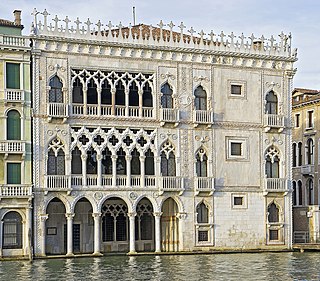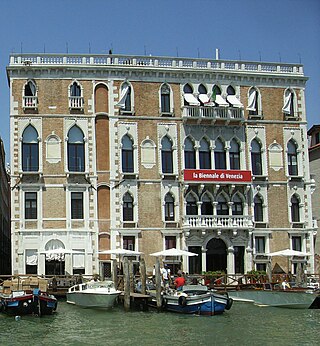The Palazzo Giustiniani Businello is Gothic-style palace located on the Grand Canal, in the Sestiere of San Polo, adjacent to the Palazzo Papadopoli, in Venice, Italy. 2000 45°26′12″N12°19′57″E / 45.436779°N 12.332436°E
Contents

The Palazzo Giustiniani Businello is Gothic-style palace located on the Grand Canal, in the Sestiere of San Polo, adjacent to the Palazzo Papadopoli, in Venice, Italy. 2000 45°26′12″N12°19′57″E / 45.436779°N 12.332436°E

The palace was commissioned in the 13th century by the aristocratic Morosini family, but later transferred to the Giustiniani family. In the 18th century, the Businello became owners of the palace. In the 19th century, it housed the dancer Maria Taglioni. The building has undergone a number of renovations. [1]

The Ca' d'Oro or Palazzo Santa Sofia is a palace on the Grand Canal in Venice, northern Italy. One of the older palaces in the city, its name means "golden house" due to the gilt and polychrome external decorations which once adorned its walls. Since 1927, it has been used as a museum, as the Galleria Giorgio Franchetti.

The House of Giustiniani was a prominent Italian family which originally belonged to Venice, but also established itself in Genoa, and at various times had representatives in Naples, Canary Islands, Corsica and in the islands of the Archipelago, where they had been the last Genoese rulers of the Aegean island of Chios, which had been a family possession for two centuries until 1566. The family claimed descent from Byzantine emperor Justinian I.

The Palazzo Tiepolo is a Renaissance-style palace located between the Palazzo Soranzo Pisani and the Palazzo Pisani Moretta on the Grand Canal, in the Sestieri of San Polo, Venice, Italy.

The Palazzo Giustinian is a palace in Venice, northern Italy, situated in the Dorsoduro district and overlooking the Grand Canal next to Ca' Foscari. It is among the best examples of the late Venetian Gothic and was the final residence of Princess Louise of Artois.

Palazzo Loredan dell'Ambasciatore is a late 15th-century Gothic palace in Venice, Italy, that once belonged to the noble Loredan family. Located in the Dorsoduro sestiere (quarter), it was called "dell'Ambasciatore" because it was offered as a home of the ambassadors of the Austrian Empire to the Republic by Doge Francesco Loredan.

Palazzo Belloni Battagia is a palace on the Canal Grande, Venice, northern Italy. It is located in the sestiere (district) of Santa Croce, between the Fondaco del Megio and Ca' Tron, near the church of San Stae.

The Palazzo Giustinian Lolin is a Baroque style palace located on the Grand Canal of Venice, Italy. The present facade was designed circa 1630 by Baldassare Longhena. It is used as an exhibition venue for the Venice Biennale.

The Palazzo Donà della Madoneta is a Gothic-style palace located on the Canal Grande of Venice, between Casa Sicher and Palazzo Donà a Sant'Aponal in the Sestiere of San Polo, Venice, Italy.

The Palazzo Donà a Sant'Aponal, also known as the Palazzo Donà or Palazzo Donà dalle Trezze, is a Gothic-style palace located on the Canal Grande of Venice, between Palazzo Papadopoli and Palazzo Donà della Madoneta in the Sestiere of San Polo, Venice, Italy.

The Palazzo Papadopoli is a Baroque-style palace located on the Canal Grande of Venice, between Palazzo Giustinian Businello and Palazzo Donà a Sant'Aponal in the Sestiere of San Polo, Venice, Italy. The opposite building is the Palazzo Corner Contarini dei Cavalli.

The Palazzo Morosini Brandolin is a Gothic-style palace located at the corner with the Rio di San Tomà, near Palazzo Tiepolo and across the canal from Ca' d'Oro on the Grand Canal, in the Sestieri of San Polo, Venice, Italy.

The Palazzo Giustinian Persico is an early-Renaissance-style palace located at the corner with the Rio di San Tomà, near Palazzo Tiepolo and across the canal from Palazzi Mocenigo on the Grand Canal, in the Sestiere of San Polo, Venice, Italy.

The Palazzo Fontana Rezzonico is a palace located on the Canal Grande of Venice, between the Rio di San Felice and Palazzo Miani Coletti Giusti in the Sestiere of Cannaregio, Venice, Italy.

The Palazzo Giusti, also known as the Palazzo Miani Coletti Giusti, is a Neoclassic-style palace located on the Canal Grande of Venice, between Ca' d'Oro and Palazzo Fontana Rezzonico in the Sestiere of Cannaregio, Venice, Italy.

The Palazzo Ruzzini is 19th-century, neoclassic-style palace located between the Rio adjacent to the Fontego dei Tedeschi and the Casa Perducci and Palazzo Civran on the Grand Canal, in the Sestiere of Cannaregio, in the city of Venice, Italy. The central part of the facade is decorated with a trifora and quadrifora.

The Palazzo Grimani Marcello, also known as Giustinian Querini is a Renaissance-style palace in located on the Grand Canal, between the Palazzo Querini Dubois and the Palazzo Cappello Layard in the sestiere of San Polo of Venice, Italy.

Palazzo Giustinian Pesaro is a Gothic palace located in Venice, Italy, in the Cannaregio district and overlooking the Grand Canal. The palazzo is situated between Ca' d'Oro and Palazzo Morosini Sagredo.

The Ca' Giustinian, sometimes called the Palazzo Giustinian, is a palace on the Grand Canal in the San Marco sestiere of Venice, Italy. It is today the seat of the Venice Biennale. Built in 1471, it was among the last Gothic palazzi built in Venice. It was partially modernized in the 17th century.

Palazzo Mocenigo Gambara is a palace in Venice, located in the Dorsoduro district and overlooking the Grand Canal, between the Contarini Palazzi degli Scrigni and Corfù and Palazzo Querini alla Carità, not far from the Gallerie dell'Accademia and in front of Palazzo Giustinian Lolin.
Palazzo Giustiniani may refer to: